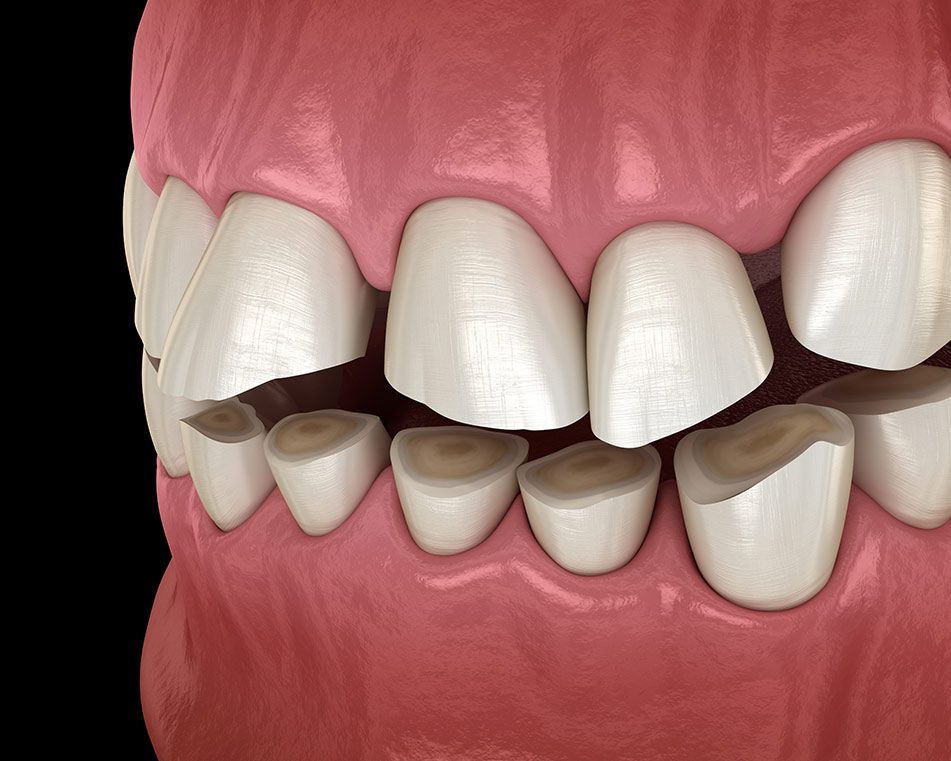Most people will suffer from jaw joint (temporomandibular joint or TMJ) problems during their lifetime. In some patients, this can become a chronic issue, often related to interferences in your bite, following dental treatment such as orthodontics or wisdom tooth extraction or staying open for long periods, but also due to postural problems or injury.
TMJ dysfunction, tooth clenching, tooth grinding, breakage or wear of teeth or dental work, and acute or chronic pain related to these interrelated issues are common.
We have a systematic approach to TMJ diagnosis including MRI scanning and proper bite analysis based on your TMJ position.
A proper documented diagnosis, prescription of correctly designed bite deprogrammers (also called splints, nightguards, biteguards or bite appliances), bite equilibration, orthodontic tooth movement and collaboration with sports medicine and sleep medicine colleagues are all part of our daily work to alleviate these problems.
Prevention of long-term damage to your joints and teeth can be very straightforward if diagnosed and treated correctly.

What is TMJ?
TMJ stands for temporomandibular joint.
Patients who say they have TMJ or bite problems refer to dysfunction of their jaw joints and the muscles that control their lower jaw movements.
TMJ dysfunction is very common, and most people will experience it at some point in their lives.
It can be self-limiting but, in many patients, symptoms can persist and lead to progressive physical damage and degenerative changes in the joint.
This may also affect, and be affected by, their bite.

I have difficulty, pain, noise or locking when opening my mouth or chewing
Many people experience temporary jaw pain or locking at some point in their lives.
However, in some patients this can become a chronic problem that can cause a great deal of discomfort.
We can assess and properly diagnose and treat a whole range of temporomandibular joint disorders to alleviate pain, restore mobility and ensure a stable, comfortable bite.

I grind or clench my teeth
Patients who grind or clench their teeth over a long period of time can experience a variety of symptoms including headaches, migraines, jaw pain, progressive and uncontrolled tooth or dental work breakage, wear of teeth and dental restorations and disturbed sleep.
By diagnosing all the contributory factors we can successfully control and, in many cases, help eliminate the effects of grinding and clenching and the damage that these habits can do.
Please contact us to see how we can help.

I get headaches or jaw muscle stiffness and cannot open my mouth properly
Headaches or jaw muscle stiffness can be a symptom of grinding or clenching of teeth or a bite imbalance.
We have a systematic method of assessing and diagnosing such problems and addressing the causes to restore comfort.

Neck and back strain linked with TMJ dysfunction
Often, TMJ dysfunction can present with other injuries or symptoms including back strain or post-injury pain.
We work with Dr Phil Batty at The Cleveland Clinic and Mr Dylan Elmore Gyrotonics to collaborate on your overall physical wellbeing from injury rehabilitation to rebuilding core strength.

My teeth keep breaking or wearing down
Repeated breakage of teeth or advanced tooth wear are pathological processes that need to be controlled to prevent long-term damage.
We look at multiple factors that may be contributing, including tooth grinding (bruxism), acid erosion, bite imbalance and temporomandibular joint dysfunction to control destructive forces being applied to the teeth and to restore damage that has been inflicted in the past.

